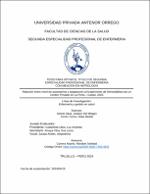Relación entre nivel de autoestima y adaptación al tratamiento de hemodiálisis de un Centro Privado en La Perla – Callao, 2023

Date
2024Author(s)
Ghersi Daza, Joselyn Del Milagro
Torres Torres, Katia Medali
Metadata
Show full item recordAbstract
La presente investigación tuvo como objetivo determinar la relación entre el nivel de
autoestima de pacientes con enfermedad renal crónica y la adaptación al tratamiento
de hemodiálisis de un Centro Privado en La Perla – Callao, 2023. Se realizó un estudio
de tipo correlacional transversal con diseño no experimental en el que se incluyeron a
60 pacientes según criterios de selección. Para recolectar los datos se utilizó como
técnica la encuesta y como instrumentos dos cuestionarios para evaluar el nivel de
autoestima y adaptación. Se obtuvo como resultados que el nivel de autoestima de
pacientes fue alto con 78% y baja con 22%; asimismo no se apreciaron diferencias
significativas respecto a las variables edad, sexo, estado civil, grado de instrucción y
tiempo de hemodiálisis entre los pacientes con autoestima baja o alta (p>0.05). En
cuanto a la distribución de pacientes según su nivel de adaptación, 53% obtuvieron un
nivel de adaptación integrado, 32% compensatorio y 15% comprometido. Finalmente
se comprobó que existe relación entre el nivel de autoestima de pacientes con
enfermedad renal crónica y la adaptación al tratamiento de hemodiálisis con un Chi
cuadrado de Pearson de 10.2 con p-valor de 0.028, el cual fue significativo (p<0.05) The objective of this research was to determine the relationship between the level of
self-esteem of patients with chronic kidney disease and the adaptation to hemodialysis
treatment at a Private Center in La Perla – Callao, 2023. A cross-sectional correlational
study with a non-specific design was carried out. experimental in which 60 patients
were included according to selection criteria. To collect the data, the survey is used as
a technique and two questionnaires are used as instruments to evaluate the level of
self-esteem and adaptation. The results were that the level of self-esteem of the
patients was high with 78% and low with 22%; Likewise, no significant differences were
observed regarding the variables age, sex, marital status, level of education and time
on hemodialysis between patients with low or high self-esteem (p>0.05). Regarding the
distribution of patients according to their level of adaptation, 53% obtained a level of
integrated adaptation, 32% compensatory and 15% compromised. Finally, it was
proven that there is a relationship between the level of self-esteem of patients with
chronic kidney disease and adaptation to hemodialysis treatment with a Pearson's Chi
square of 10.2 with p-value of 0.028, which was significant (p<0.05).

